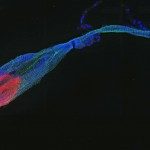Lien vers Pubmed [PMID] – 22675496
PLoS ONE 2012;7(6):e37873
Glaucoma, the most common cause of irreversible blindness, is a neuropathy commonly initiated by pathological ocular hypertension due to unknown mechanisms of trabecular meshwork degeneration. Current antiglaucoma therapy does not target the causal trabecular pathology, which may explain why treatment failure is often observed. Here we show that the chemokine CXCL12, its truncated form SDF-1(5-67), and the receptors CXCR4 and CXCR3 are expressed in human glaucomatous trabecular tissue and a human trabecular cell line. SDF-1(5-67) is produced under the control of matrix metallo-proteinases, TNF-α, and TGF-β2, factors known to be involved in glaucoma. CXCL12 protects in vitro trabecular cells from apoptotic death via CXCR4 whereas SDF-1(5-67) induces apoptosis through CXCR3 and caspase activation. Ocular administration of SDF-1(5-67) in the rat increases intraocular pressure. In contrast, administration of a selective CXCR3 antagonist in a rat model of ocular hypertension decreases intraocular pressure, prevents retinal neurodegeneration, and preserves visual function. The protective effect of CXCR3 antagonism is related to restoration of the trabecular function. These data demonstrate that proteolytic cleavage of CXCL12 is involved in trabecular pathophysiology, and that local administration of a selective CXCR3 antagonist may be a beneficial therapeutic strategy for treating ocular hypertension and subsequent retinal degeneration.

